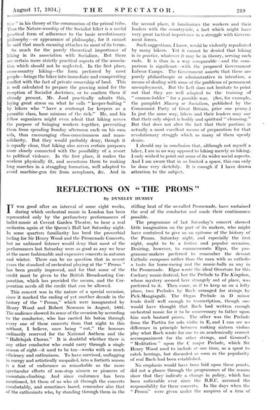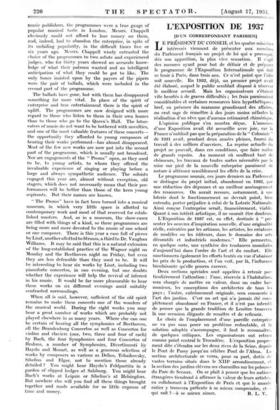REFLECTIONS ON "THE PROMS"
By DYNELEY HUSSEY
IT was good after an interval of some eight weeks, during which orchestral music in London has been represented only by the perfunctory performances of ballet-music at Covent Garden Theatre, to hear a real orchestra again at the Queen's Hall last Saturday night. In some quarters familiarity has bred the proverbial feeling for Sir Henry Wood and the Promenade Concerts, but no unbiased listener would deny that most of the performances last Saturday were as good as any we hear at the more fashionable and expensive concerts in autumn and winter. There can be no question that in recent years the standard of orchestral playing at the " Proms " has been greatly improved, and for that some of the credit must be given to the British Broadcasting Cor- poration, which has provided the means, and the Cor- poration needs all the credit that can be allowed.
This concert was in the nature of a special occasion, since it marked the ending of yet another decade in the history of the "Proms," which were inaugurated by Henry Wood and Robert Newman in August, 1895. The audience showed its sense of the occasion by according to the conductor, who has carried his baton through every one of these concerts from that night to this without, I believe, once being "out," the honours ordinarily reserved for the National Anthem and the "Hallelujah Chorus." It is doubtful whether there is any other conductor who could carry through a single season of eight—it used to be ten—weeks with so much efficiency and enthusiasm. To have survived, unflagging in energy and artistically unspoiled, into.a fortieth season is a feat of endurance as remarkable as the more spectacular efforts of non-stop airmen or pioneers of mountain-climbing. And since endurance has been mentioned, let those of us who sit through the concerts comfortably, and sometimes bored, remember also that of the enthusiasts who, by standing through them in the stifling heat of the so-called Promenade, have sustained the zeal of the conductor and made their continuance possible.
The programme of last Saturday's concert showed little imagination on the part of its makers, who might have contrived to give us an epitome of the history of the Proms. Saturday night, and especially the first night, ought to be a festive and popular occasion. Desiring, however, to commemorate Elgar, the pro- gramme-makers preferred to remember the devout Catholic composer rather than the man with as catholic a taste for horse-racing and the music-halls as any in the Promenade. Elgar wrote the ideal Overture for this Cockney music-festival, but the Prelude to The Kingdom, whose mystery seemed here strangely out of place, was preferred to it. Then came, as if to keep us on a lofty plane, two Preludes by Bach arranged for strings by Pick-Mangiagalli. The Organ Prelude in D minor lends itself well enough to transcription, though one would have thought that Bach had written enough orchestral music for it to be unnecessary to father upon him such bastard pieces. The other was the Prelude from the Partita for solo violin in E, and I can see n3 difference in principle between making sixteen violins play what Bach wrote for one to an academically correct accompaniment for the other strings, and Gounod's " Meditation " upon the C major Prelude, which Sir Henry Wood used to include at one time, as a sprat to catch herrings, but discarded as soon as the popularity of real Bach had been established.
No emphasis would have been laid upon these points, did not a glance through the programmes of the season show that they indicate a change in policy, which has been noticeable ever since the B.B.C. assumed the responsibility for these concerts. In the days when the "Proms" were given under the auspices of a firm of music publishers, the programmes were a true gauge of popular musical taste in London. Messrs. Chappell obviously could not afford to lose money on them, and, indeed, had to abandon the enterprise, in spite of its unfailing popularity, in the difficult times five or six years ago. Messrs. Chappell wisely entrusted the choice of the programmes to two astute and experienced judges, who for thirty years showed an accurate Imow- ledge of what their patrons wanted and an intelligent anticipation of what they could be got to like. The only tunes insisted upon by the payers of the pipers were the pair of ballads, which were included in the second part of the programme.
The ballads have gone, but with them has disappeared something far more vital. In place of the spirit of enterprise and true entertainment there is the spirit of uplift. The programmes are now designed with more regard to those who listen to them in their own homes than to those who go to the Queen's Hall. The lotus- eaters of music do not want to be bothered with novelties, and one of the most valuable features of these concerts— the opportunity they afforded to young composers of hearing their works performed—has almost disappeared. Most of the few new works are now put into the second part of the programme, which is usually not broadcast. Nor are engagements at the "Proms" open, as they used to be, to young artists, to whom they offered the invaluable experience of singing or playing before a large and always sympathetic audience. The soloists engaged this year are, almost without exception, old stagers, which does not necessarily mean that their per- formances will be better than those. of the keen young aspirants. But their names are known.
"The Proms" have in fact been turned into a musical museum, in which very little space is allotted to contemporary work and most of that reserved for estab- lished masters. And, as in a museum, the show-cases are filled with things of a kind, so these programmes are being more and more devoted to the music of one school or one composer. There is this year a case full of pieces by Liszt, another allotted to Strauss, a third to Dr. Vaughan Williams. It may be said that this is a natural extension of the long-established practice of the Wagner night on Monday and the Beethoven night on Friday, but even they are less defensible than they used to be. It will be interesting to hear six woiks by Liszt, including two pianoforte concertos, in one evening, but one doubts whether the experience will help the revival of interest in his music. It would be far more pleasurable to hear these works on six different evenings amid suitably contrasted surroundings.
When all is said, however, sufficient of the old spirit remains to make these concerts one of the wonders of the musical world. During the eight weeks you may hear a great number of works which are probably not played elsewhere in as many years. Where else can one be certain of hearing all the symphonies of Beethoven, all the ,Brandenburg Concertos as well as Concertos for violins and claviers (one, two, three and four of each) by Bach, the four Symphonies and four Concertos of Brahms, a number of Symphonies, Divertimenti liy Haydn and Mozart, as well as a generous selection of works by composers so various as Delius, Tehaikovsky, Sibelius and Elgar, not to mention those already . detailed ? You might hear Haydn's Feldpartita in a garden of clipped hedges at Salzburg. You might hear Bach's works at Leipzic or Sibelius's at Helsingfors. But nowhere else will you find all these things brought together and made available for so little expense of time and money.



































 Previous page
Previous page